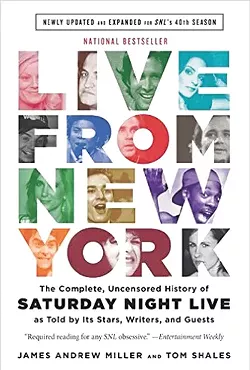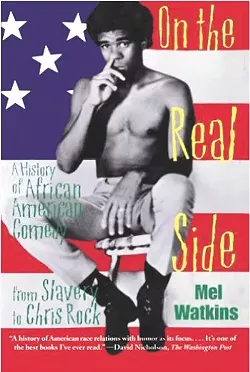If you've heard of a comedian, chances are he or she has published a book; the catalog of comic-penned tomes is a deep one of widely varying quality.
Less vast is the selection of books about comedy and its purveyors, histories that tell us how the world of the professionally funny has evolved from telling jokes at supper clubs into the modern age. Here are a few great reads that enlighten as well as entertain.
Live from New York: An Uncensored History of Saturday Night Live, as Told By Its Stars, Writers and Guests, by Tom Shales and James Andrew Miller (2002)
Every generation has its favorite era of the long-running NBC staple Saturday Night Live, and they all love to talk about how the old days were better and how the current cast — no matter what year we're talking about — is the one that is so unfunny it will kill SNL once and for all. Shales and Miller do a great job outlining how the revolutionary show made it to the airwaves in the first place, and how it's survived all the critical slings and arrows since, through remarkably sourced interviews that, among many revelations, make one thing abundantly clear — everyone hates Chevy Chase.
We Killed: The Rise of Women in American Comedy, by Yael Kohen (2012)
The strength of this book is not just the sprawling case it makes for how vital women's contributions have been to comedy for generations — from stand-up to radio to television — but also the oral-history format that allows many of those women to talk about how certain comics inspired their careers. Reading praise for pioneers like Elaine May and Gilda Radner is always a treat.
On The Real Side: The History of African American Comedy, by Mel Watkins (1994)
This book was reissued in 1999, and while some aspects are indeed dated, like most things regarding race in America, it's amazing and frustrating how current many aspects are in reflecting the challenges faced by black comedians. Watkins dives deep, into humor on the slave plantations and minstrel circuit, before featuring more modern faces of black comedy, from Richard Pryor to Eddie Murphy and Chris Rock.
Seriously Funny: The Rebel Comedians of the 1950s and 1960s, by Gerald Nachman (2003)
Many of the names might not be immediately familiar, but Nachman's look at 26 comedians who pushed the envelope at a far more conservative time, blurring the line between comedy and social commentary decades before The Daily Show, makes for great reading. You get stories of comedians arrested for the content of their jokes (Lenny Bruce) and threatened by presidents (Mort Sahl), as well as deep dives into some the dark personal lives behind funny facades. ♦


